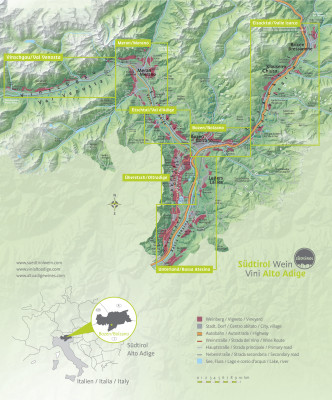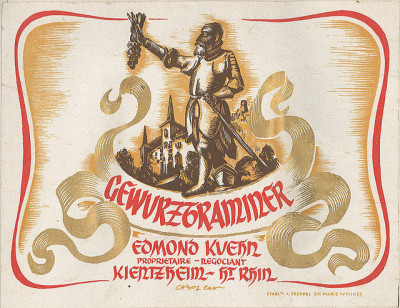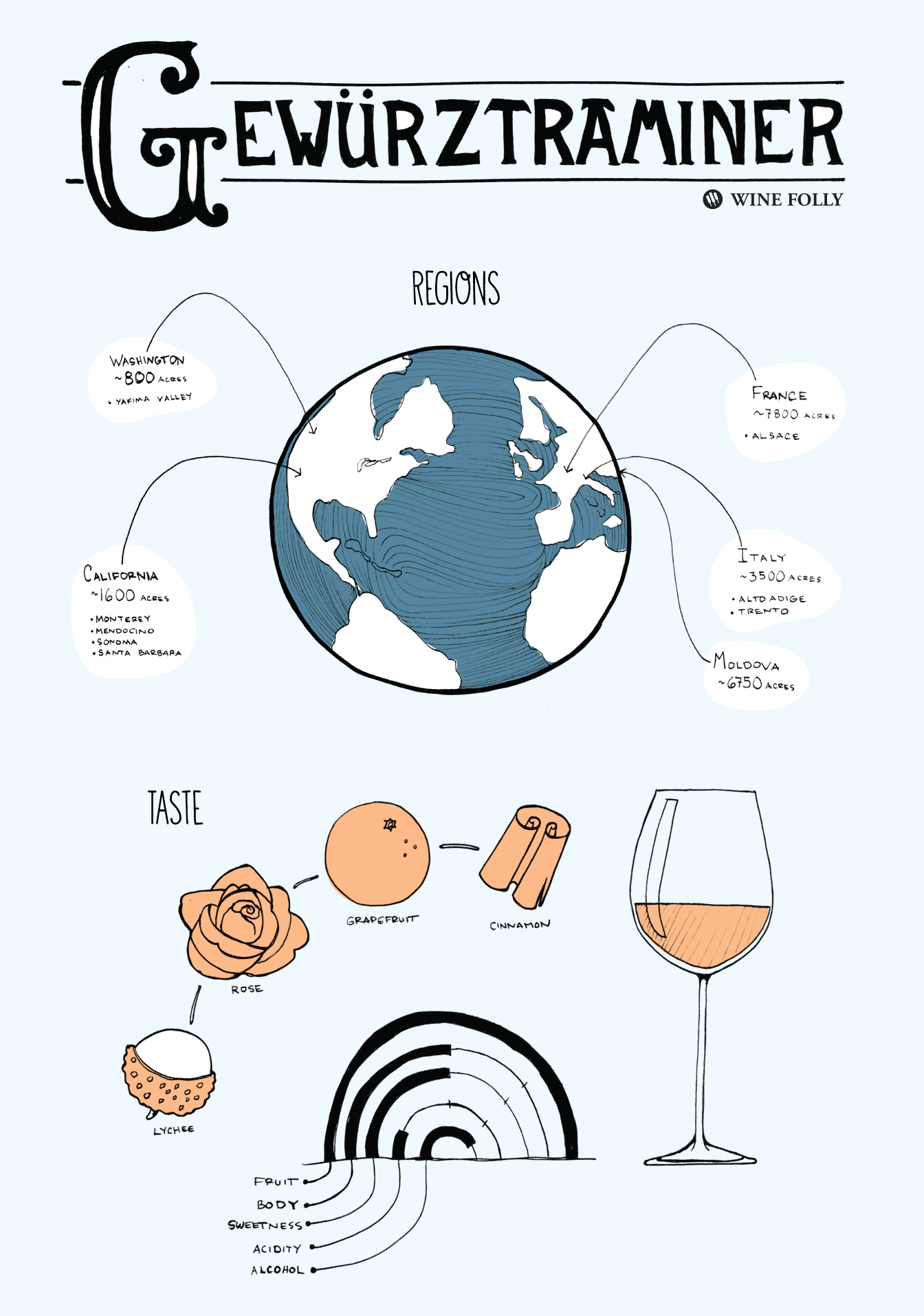Gewürztraminer is typically one of the first wines to get released after the new year in early spring. If you love spice-driven cuisines such as Thai, Indian and Arabic foods, you’ll find Gewürztraminer to be a perfect match. You can typically pick up a decent bottle for around $10 and an exceptional Gewürztraminer for $16–22.
- Gewürz: ‘Spice’
- Traminer: old name of the grape
All told, there are only about 35,000 acres of Gewürztraminer in the world, which, compared to Chardonnay at nearly 500,000 acres, means the wine is pretty unique. If you’re on the search for a perfect Gewürztraminer, you might like to start with the following 5 regions.
Gewürztraminer: Different Tastes from Different Regions
Springtime is when most producers release their latest vintage of Gewürztraminer. So from early March, you’ll see fresh Gewürztraminer wines filling the shelves.
Where to find awesome undervalued Gewürztraminer
France
 Great Region: Alsace
Great Region: Alsace
Styles: dry, off-dry and dessert (VT, SGN)
Expect to spend:
- $13–18 for exceptional dry aromatic Gewürztraminer
- $20–27 for off-dry Reserve and Grand Cru quality
- $40–50 for exceptional Selection de Grains Nobles (SGN) or Vendage Tardive (VT)
Alsace is the largest producer of Gewürztraminer in the world and the majority of wines are made in a rich floral dry style. The dry Gewürztraminers from Alsace have explosive aromas and offer creamy flavors of lychee, honeydew melon and rose. You’ll find the best quality wines in the Haut-Rhin (upper Rhine River) sub-region in the Southern part of the appellation.
Gewürztraminer Food Pairing: Match with spiced Arabic or Indian foods, especially Biryani (saffron rice dish), Palak Paneer and Manakeesh/Manakish (an awesome Arabic flat bread with Za’atar spices on top)
Buying Tips: Alsace is known for producing age-worthy Gewürztraminer wines, so it’s not uncommon to find good wines that are 6–10 years old. Aging typically adds spice flavors of cinnamon, ginger and smoke. So, keep your eyes peeled for ‘Reserve’ Gewürztraminer or a wine made from one of the 51 Grand Cru vineyards. If you do end up buying an older vintage (because French Gewürz ages quite well) look for a good vintage because acidity level is naturally low in this wine.
Vintage Notes Alsace:
2014: Good for Riesling and Pinot Blanc, but be sure to seek quality producers for Gewürztraminer
2013: Harvest rains caused problems, seek quality producers.
2012: Great for Gewürztraminer
2011: Too hot for for Gewurz…
2010: Inconsistent quality, not really great for Gewürztraminer
2009: Excellent vintage, perfect for buying Reserve and Grand Cru wines
Italy
 Great Region: Trentino-Alto Adige
Great Region: Trentino-Alto Adige
Styles: dry
Expect to spend: $15–25 for exceptional dry Gewürztraminer
Italy is the second importer of Gewürztraminer to the US (Moldova wines typically go to Russia). You’ll find most Gewürztraminer coming from Trentino-Alto Adige region in Northern Italy. Wines from this area have intense aromas of rose potpourri and sweet ripe peaches but when you taste them they are quite dry and salt (almost like a dry hard cider or sake).
Gewürztraminer Food Pairing: Match with Southeast Asian cuisine like Thai Curries, especially green curry, Vietnamese fresh rolls with shrimp or tofu and peanut sauce and Japanese Hamachi sushi
Vintage Notes Trentino-Alto Adige:
2014: Excellent for both Gewürztraminer and Pinot Grigio
2013: Rains during harvest, but not bad for Gewürztraminer, look for quality producers
2012: Great for Gewürztraminer, a smaller vintage with drought-like conditions producing concentrated wines
2011: Good for Gewürztraminer, a smaller vintage that struggled with rains, look for quality producers
2010: Great for Gewürztraminer, produced wines with higher acidity and elegance
The Story of Gewürztraminer
 The Gewürztraminer grape is named after the city of Tramin in Northern Italy which is in an alpine valley on the Sourthern border of Alto Adige and Trentino. Until recently we though Gewürztraminer was related to a grape called “Traminer” but DNA profiling eventually told us that the pink grape is an aromatic mutation of a rare variety called ‘Savagnin’ (not to be confused with Sauvignon Blanc), which has its roots in France and Germany.
The Gewürztraminer grape is named after the city of Tramin in Northern Italy which is in an alpine valley on the Sourthern border of Alto Adige and Trentino. Until recently we though Gewürztraminer was related to a grape called “Traminer” but DNA profiling eventually told us that the pink grape is an aromatic mutation of a rare variety called ‘Savagnin’ (not to be confused with Sauvignon Blanc), which has its roots in France and Germany.
California
Great Regions: Monterey, Mendocino and Sonoma
Styles: dry, sweet
Expect to spend: $10–18 for exceptional dry Gewürztraminer
California is the largest producer of Gewürztraminer in the US, but because most of the state is so warm you’ll want to look for Gewürztraminer from the cooler sub-regions including Monterey, Mendocino and Sonoma. The dry versions of Gewürztraminer from California have aromas of lychee and taste like Florida grapefruit with a touch of dry hard cider. As the wine ages, it takes on allspice and ginger aromas.
Gewürztraminer Food Pairing: Try as an aperitif with appetizers such as soft to semi-firm cow’s and sheep’s milk cheeses, Honeydew melon salad with fennel and prosciutto and sushi roll (California roll anyone?).
Additional Notes: Speaking of cooler climates, the Arroyo-Seco sub-AVA in Monterey, the Alexander Valley sub-AVA in Sonoma and Mendocino are well known for producing some outstanding California Gewürz. Since the state has no rules in terms of dry vs sweet, assume the wine is sweet unless the producer specifically mentions that the wine is dry either on the label or in their tasting notes online.
Vintage Notes California:
2012–2014: Generally considered good for Gewürztraminer from the cooler regions listed above.
Washington
 Great Regions: Columbia Gorge, Ancient Lakes and Lake Chelan
Great Regions: Columbia Gorge, Ancient Lakes and Lake Chelan
Styles: dry, sweet
Expect to spend:
- <$10 for off-dry and sweet Gewürztraminer
- $17 for exceptional dry Gewürztraminer
Washington may be a small region for Gewürztraminer, but it also offers some of the most ridiculous values for this wine. Of course, the wines under $10 will almost certainly be sweet and simple, so be sure to buy them as youthful as possible, otherwise you might be disappointed with their lack of acidity. The more interesting Gewürztraminer from this area is mostly out of the Columbia Gorge, a stunningly beautiful river region with intense cooling winds from the Pacific ocean.
Additional Notes: Since Gewürztraminer looses its acidity as it ripens, be very wary of late harvest wines from this area or Gewürztraminer that is picked at a high Brix degree. They may taste like they have high acidity but more than likely, these wines are artificially acidified with tartaric acid. Tartaric acid isn’t bad for you, but it makes for an odd sweet tart candy taste that grates on your palate after the first few sips. Since the region has no rules in terms of dry vs. sweet, assume the wine is sweet unless the producer specifically denotes the wine as dry either on the label or in their tasting notes online.
Vintage Notes Washington:
2012–2014: Hot year. Not all that great for Gewürztraminer that wasn’t picked super early, look for Columbia Gorge wines for benchmark examples.
2011 & 2010: Great years for whites like Gewürztraminer from Washington look for wines that were designed to age.
